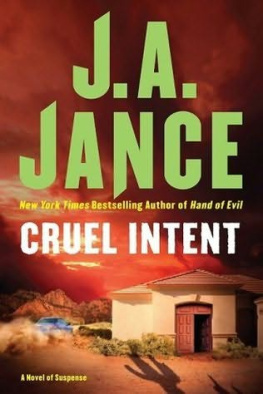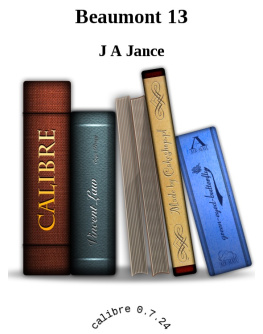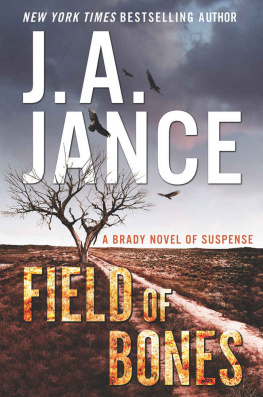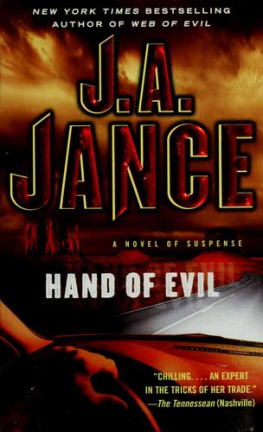Synopsis:
A terrifying truth is buried at the juncture where lethal greed and unassailable power converge.
The dead woman was an artist recently arrived from Washington State, cruelly cut down in the early stages of a promising career. Now all that remains of Rochelle Baxter lies on a cold slab in the Cochise County morgue, and Sheriff Joanna Brady knows that murder has once again infected her small desert community.
But there is more to this homicide than initially meets the eye and more to the victim, who died while supposedly under the conscientious protection of the government.
A big-city legal establishment has no faith in the abilities of a small-town sheriff, let alone a female sheriff. Instructed to swallow her indignation, Joanna awaits the arrival of the help Washingtons attorney general is sending her: the newest member of the states Special Homicide Investigation team a man named Beaumont.
Bisbee, Arizona, is the last place J.P. Beaumont wants to be. The ghosts of a painful past are too numerous there, and his reluctant partner, Sheriff Brady, resents his intrusion and cannot help but make her feelings known. But the road they are forced to travel together is taking some unexpected turns, running two dedicated servants of the law headfirst into the impenetrable stone walls of a shocking conspiracy of silence. For Brady and Beaumonts hunt is disturbing a very deadly nest of rattlers, and suddenly trust is the only option they have.
On their own in the Arizona desert, they know death can be cold and quick. And nobody is watching their backs here... theyll have to watch each others.
Partner In Crime
J.A. Jance
The tenth book in the Joanna Brady series
Copyright 2002 by J. A. Jance
For Mr. Bone. For Sunny, Huck, and Zeke.
For the Nickkis (both of them). For Tess and Mandy.
Azalea and Scratch. Boots and Barney.
Daphne and Ag.
And last but not least, for Daisy Mae.
Prologue
WELL? DEIDRE CANFIELD ASKED, as she mopped her dripping forehead and straightened the last picture. What do you think? Rochelle Baxter stood back and eyed the painting critically. It was one of sixteen pieces in her first-ever gallery showing. With occasional heavy-lifting help from Dees boyfriend, Warren Gibson, the two women had spent the previous six hours hanging and rehanging the paintings in Dees recently remodeled and for anyone doing physical labor incredibly overheated Castle Rock Gallery in Bisbee, Arizona. For Dee it was a new beginning. For Rochelle, it was something else.
Its fine, she said. Then, seeing how her lack of enthusiasm caused a cloud of concern to cross Dees broad face, Rochelle added quickly, Its great, Dee. Really, its fine.
Im glad you like it, Dee said. And dont worry. I know this show is going to be a huge success. You heard the phone calls that came in about it just today. Im betting well have an overflow crowd for tomorrows grand opening.
Deidre Canfield may have been convinced, but Rochelle wasnt so sure. I hope so, she said dubiously.
Dee grinned. Whats wrong, Shelley? Sounds like youre suffering from a case of opening-night jitters.
Maybe so, Rochelle admitted. In fact, probably so.
Take my word for it, Dee assured her. Ive been managing art galleries for years. I know what people like, and Im telling you, theyre going to love your stuff. What worries me is that well sell out so fast that some people will go away disappointed. Im a lot more concerned about that than I am about no one showing up.
Turning away, Dee walked over to her desk and picked up her purse. Warren wants me to give him a lift to the house, and I have to stop by the bank before it closes. Want to ride along?
Rochelle shook her head. You two go ahead. If you dont mind, Dee, Id rather stay here. I want to be alone with the paintings for a little while.
Dee smiled sympathetically. It must seem like saying good-bye to a bunch of old friends.
Rochelle nodded, but she kept her face averted so the tears welling up in her eyes didnt show. Dees comment was far closer to the mark than Rochelle Baxter wanted to admit. Something like that, she murmured.
Dee shrugged. Suit yourself, she said. Stay as long as you like. Ill be back in forty-five minutes or so. I also need to do some last-minute consulting with the caterer. Ill lock the door and put up the closed sign. If someone wants in, ignore them. Dont bother opening the door. Eventually theyll get the message and go away. If you have to leave before I get back, pull the door shut behind you.
Will do, Rochelle replied.
Dee and Warren left then, walking out into the warm autumn weather of a late-October Arizona afternoon. They made an incongruous, Jack Sprat sort of couple. Warren was tall and lanky and looked as though hed never eaten a square meal in his life. Dee was short and almost as wide as she was tall. He wore a faded denim shirt, frayed jeans, and equally worn tennis shoes. Dees roly-poly figure was swathed in a flowing tie-dyed smock that covered her from her plump neck to the toes of her aging Birkenstocks. The only similarity lay in their hairdos. Both wore their hair pulled back into single braids, although Dees gun-metalcolored plait was a good two feet longer than Warrens.
The afternoon temperature was a mild eighty-three degrees. Nevertheless, Dee insisted on keeping a reflective sunshade inside the windshield of her elderly Pinto station wagon. Rochelle watched as Warren pulled the sunshade out of the window and stowed it in the backseat. Then he climbed into the riders side of the multicolored rattletrap vehicle whose dented panels had been painted in vivid shades of lacquer that almost rivaled Deidres equally multicolored smock. Dee crammed herself behind the steering wheel.
After three separate tries, the touchy old engine finally wheezed to life. Driving with little-old-lady concentration, Dee eased the Pinto into what passed for rush-hour traffic in Bisbee and headed down Tombstone Canyon, leaving Rochelle to marvel at how a plump, wide-faced, oddly dressed white woman had, in the last few months, become both her good friend as well as an enthusiastic and unflagging artistic booster.
It was Dee Canfield who, after seeing Rochelles paintings, had decided on mounting a one-woman show. Reminiscent of Norman Rockwell, Dee had pronounced upon viewing Rochelles collection of work. People wont be able to keep from buying it. It has that same old-fashioned, uncomplicated look and feel to it. There are a lot of people out there who are sick and tired of so-called artists who throw globs of paint on canvas and pronounce it fine art.
Rochelle didnt entirely share Dees confidence about the salability of her work. There was good reason that her paintings were reminiscent of Norman Rockwell. As a child growing up in Macon, Georgia, Rochelle had pored over a book one of her grandmothers coffee-table books that was chock-full of Norman Rockwells paintings. She had paged through each picture one by one, focusing all her attention and wonder on the occasional black people she saw depicted there children and old people and ordinary adults whose appearance resembled her own.
Those few dark-skinned people in the paintings, like Rockwells other subjects, were caught while engaged in the most mundane of behaviors standing outside a barbershop, riding in a wagon, playing with a ball, blowing on a harmonica. She had studied each picture with painstaking care, noticing how the artist had used light and dark to create the subtle variations of skin color. She had marveled at how Rockwell had captured intimate scenes in a way that made her feel as though she, too, knew the people depicted there. But most of all, seeing Rockwells work had made her want to emulate him to paint her subjects with the same respect and dignity he had accorded those he had painted.
Next page

